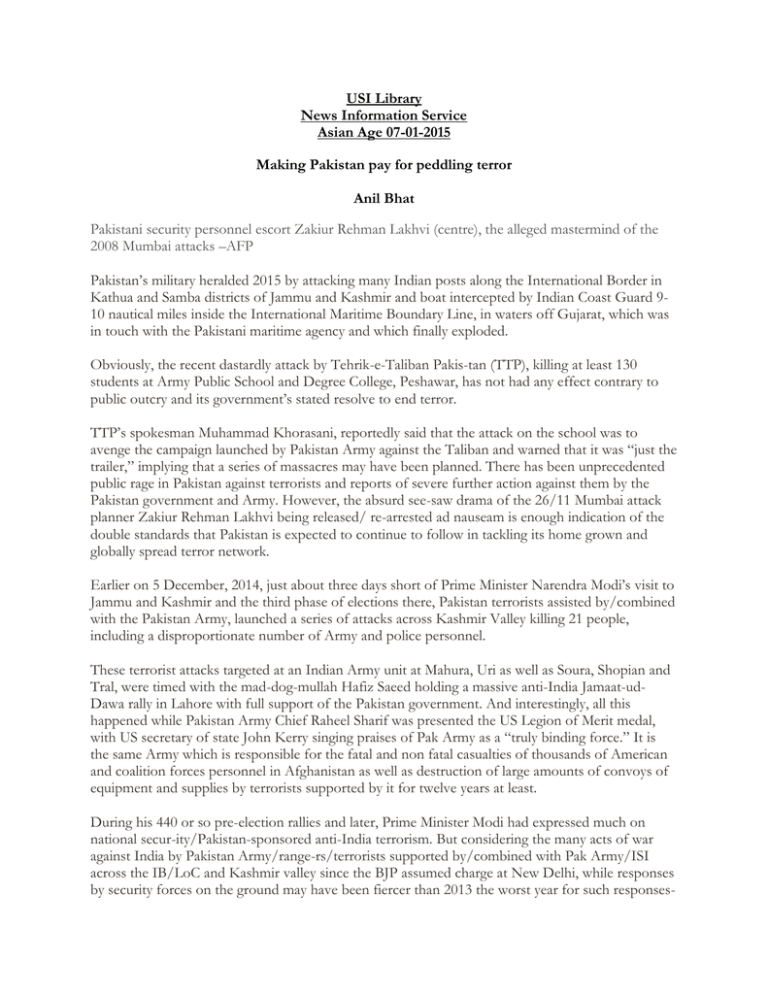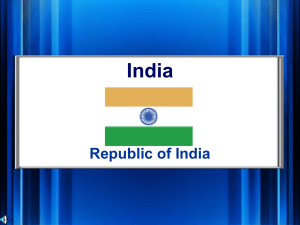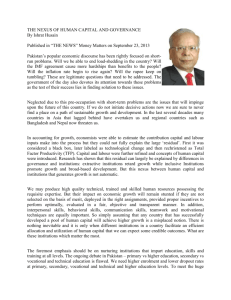USI Library News Information Service Asian Age 07-01
advertisement

USI Library News Information Service Asian Age 07-01-2015 Making Pakistan pay for peddling terror Anil Bhat Pakistani security personnel escort Zakiur Rehman Lakhvi (centre), the alleged mastermind of the 2008 Mumbai attacks –AFP Pakistan’s military heralded 2015 by attacking many Indian posts along the International Border in Kathua and Samba districts of Jammu and Kashmir and boat intercepted by Indian Coast Guard 910 nautical miles inside the International Maritime Boundary Line, in waters off Gujarat, which was in touch with the Pakistani maritime agency and which finally exploded. Obviously, the recent dastardly attack by Tehrik-e-Taliban Pakis-tan (TTP), killing at least 130 students at Army Public School and Degree College, Peshawar, has not had any effect contrary to public outcry and its government’s stated resolve to end terror. TTP’s spokesman Muhammad Khorasani, reportedly said that the attack on the school was to avenge the campaign launched by Pakistan Army against the Taliban and warned that it was “just the trailer,” implying that a series of massacres may have been planned. There has been unprecedented public rage in Pakistan against terrorists and reports of severe further action against them by the Pakistan government and Army. However, the absurd see-saw drama of the 26/11 Mumbai attack planner Zakiur Rehman Lakhvi being released/ re-arrested ad nauseam is enough indication of the double standards that Pakistan is expected to continue to follow in tackling its home grown and globally spread terror network. Earlier on 5 December, 2014, just about three days short of Prime Minister Narendra Modi’s visit to Jammu and Kashmir and the third phase of elections there, Pakistan terrorists assisted by/combined with the Pakistan Army, launched a series of attacks across Kashmir Valley killing 21 people, including a disproportionate number of Army and police personnel. These terrorist attacks targeted at an Indian Army unit at Mahura, Uri as well as Soura, Shopian and Tral, were timed with the mad-dog-mullah Hafiz Saeed holding a massive anti-India Jamaat-udDawa rally in Lahore with full support of the Pakistan government. And interestingly, all this happened while Pakistan Army Chief Raheel Sharif was presented the US Legion of Merit medal, with US secretary of state John Kerry singing praises of Pak Army as a “truly binding force.” It is the same Army which is responsible for the fatal and non fatal casualties of thousands of American and coalition forces personnel in Afghanistan as well as destruction of large amounts of convoys of equipment and supplies by terrorists supported by it for twelve years at least. During his 440 or so pre-election rallies and later, Prime Minister Modi had expressed much on national secur-ity/Pakistan-sponsored anti-India terrorism. But considering the many acts of war against India by Pakistan Army/range-rs/terrorists supported by/combined with Pak Army/ISI across the IB/LoC and Kashmir valley since the BJP assumed charge at New Delhi, while responses by security forces on the ground may have been fiercer than 2013 the worst year for such responses- no matter how many jihadis or even every single jihadi that Indian Army/security forces kill, is not going to make much difference to them. This is classic asymmetric warfare, in which the very aim of Pakistan forces/jihadis they support is to tie down large numbers of troops by a handful of attackers. Pakistan Army and its jihadi force-multipliers, absolutely riled up about BJP’s unprecedented victory and that too under Mr Modi and the also unprecedented voter turnout in the Valley are getting even more desperate and are expected to further step up their efforts in targeting not only J&K, but also other parts of India. Mr Modi himself, already on top of their list, has only increased his target value by his monthly-visits to J&K and his aggressive election campaign speeches. So, to effectively counter Pakistan’s military-mullah designs and aims much more needs to be done by the BJP government. While one aspect is understanding the Pakistan’s game-plan and formulating a policy for quantum of calibrated tactical response on the ground, the other aspect, which is very vital and much neglected in the past, is diplomacy and related information management. Rhetoric from political leaders without timely punitive action on ground makes the nation a laughing stock, raises the confidence of the terrorist groups and lowers the morale of the security forces. For far too long/since Independence barring India’s retaliation against Chinese at Nathu La in 1967 and India’s strategy in the third Indo-Pak war in 1971 both thanks to Indira Gandhi India’s response to aggression, particularly under Congress governments, has always been inhibited by the mantra of “not to raise the level of conflict.” 26/11 unfortunately stands out as a classic case of a pathetic response in Mumbai to no response on the borders from where the same Lashkar-e-Taiyyaba and other groups cross over to strike. 26/11 provided India with a window of opportunity to destroy Pakistan’s military assets near the borders/ known routes of ingress by terrorists. Attacks like the ones at Kalu Chak, Sambha, 2013’s beheadings or the recent one must also be responded to without delay, with accuracy and with added intensity to send the kind of message which Pakistan understands. India must make it unaffordable for Pakistan to strike at will. While Army Chief Gen. Dalbir Singh stated on taking over that the Army’s response to attacks will be “intense and immediate” and defence minister Manohar Parrikar has recently said that the response should be of “twice the energy,” it remains to be seen what it will amount to on the ground. The showing of white flags by Pakistan rangers may indicate that they are feeling the sting of retaliation, but it does not mean that their firings will cease for long. The policy and punitive response referred to has to be backed by political will for not only timely use of the appropriate amount of force on the borders, but also the capability to project force covertly and effectively well beyond the borders. Once India demonstrates that jihadi leaders like Hafiz Saeed can be eliminated wherever they are, the message will be very effective. Alongside, India must launch its diplomatic offensive in New Delhi and overseas, backed by ample coverage and comment.




